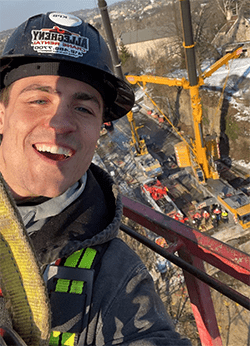Determination and grit are two things Alex Delp is well-versed in. Living just 45 minutes outside of Pittsburgh, Alex grew up a part of a strong wrestling community. Upon graduating high school, he decided to pursue competitive wrestling on an Air Force ROTC scholarship at the University of Pittsburgh.
As a freshman at the University of Pittsburgh, Alex enjoyed wrestling on the Division I team until January 2017 when he experienced a life-threatening eight-story fall.
After the accident, Alex was rushed to UPMC Presbyterian. While in the trauma bay, Alex suddenly experienced a rapid drop in his blood pressure, leading him to undergo a CT scan.
The scan revealed a blunt aortic injury, which is also known as an aortic transection. This condition is characterized by a tear in the descending thoracic aorta, the major artery carrying blood from the heart to the body, and is caused by a rapid deceleration event, such as a high-speed fall.
Alex’s care team called in vascular surgeon Michael Singh, MD, to perform an emergency thoracic endovascular aortic repair (TEVAR).
During a TEVAR procedure, the surgeon places a small needle in the groin to access an artery. Then, they insert a catheter into the artery and deploy a stent to repair the injured segment of the aorta. This life-saving surgery was the first step in Alex’s journey to recovery.
In addition to the aortic transection, Alex had sustained a brain bleed, pelvic and spine fractures, and an ankle injury. Alex was placed in a medically induced coma for five days in an effort to reduce the swelling in his brain.

“While Alex was in a coma, he would come back for 15 to 30 seconds at a time. He had learned sign language to communicate with one of his wrestling coaches when he was younger – He started signing “Water” and “Hot” to us. These were signs that he was still in there,” says Alex’s mom and dad, Teresa and Jason.
With Alex’s range of injuries, UPMC doctors took a collaborative, team approach to his care. From cardiovascular to orthopaedic to neurology, his care team coordinated and worked together to bring Alex back stronger than before.
After five days, Alex was pulled out of the medically induced coma.
“I remember waking up and seeing the room full of people,” says Alex. “My mom and dad, my high school soccer coach, and our interim pastor were all there. The care team told me to cough and then pulled out my breathing tube.”
From there, Alex was cared for by a range of specialists for the next week and a half as he regained his strength.
“The trauma nurses would tell me to go home and care for myself – Take a shower and get some sleep,” says Teresa Delp. “I remember this one day, when I came back after showering, the nurses had washed Alex’s hair and were playing music in his room. The positive energy and compassion they devoted to Alex was special.”
As Alex’s condition continued to improve, he transitioned to a recovery unit and began physical therapy to improve his strength, balance, and gait.
“The first day of PT was hard. Before the accident, I was in great shape. It was hard to process that after only a week and a half, I was now struggling to walk,” says Alex.
Luckily, Alex was determined to return to his wrestling team and didn’t back down from the challenge of physical therapy.
Once Alex was in stable condition, he was moved to Canterbury Place, a UPMC rehabilitation facility, to continue his recovery.
Here, Alex spent ten days working with physical therapy before returning to his family home.
“After I got home, I continued to build up my physical strength through upper body weightlifting. I attended follow-ups with each of my doctors and just 12 weeks after the accident, I was cleared by each of them to return to normal activities,” says Alex.
When reflecting on his journey at UPMC, Alex and his parents recall the special connections he shared with his doctors.
“We ended up finding out that Dr. Singh and Alex’s trauma surgeon, Dr. Sperry, both wrestled in high school with Dr. Sperry wrestling in college as well. They understood Alex’s wrestling mentality and his determination to bounce back from this accident better than before. They encouraged him to keep pushing,” says Jason Delp.
Alex’s determination and grit paid off. He returned to college just two months after the accident. He transferred to Pitt-Johnstown the next fall to pursue his dream of becoming a mechanical engineer. On November 5, 2017, his mother’s birthday, he competed in a wrestling tournament after only nine months and won his first college match.
“I truly have a different perspective on everything. The care I received at UPMC has allowed me to make each day better than the last and continue to grow into who I’m meant to be. When I was at UPMC, I had an overall sense of ease and knew I was in the best hands,” says Alex.
Alex has truly committed to making each day better than the last. On the fifth anniversary of his fall, he was integral in helping his community after a bridge collapse. Later, Alex got a job as a mechanical engineer and moved to Italy for 11 months. While working abroad, he traveled to cities across Europe and enjoyed once-in-a-lifetime experiences, such as skiing and camping in the Alps.
Alex has since returned to the U.S. and is living his life to the fullest. He will continue to follow up with his UPMC doctors over his lifetime to monitor his health.
Alex’s treatment and results may not be representative of all similar cases.



















